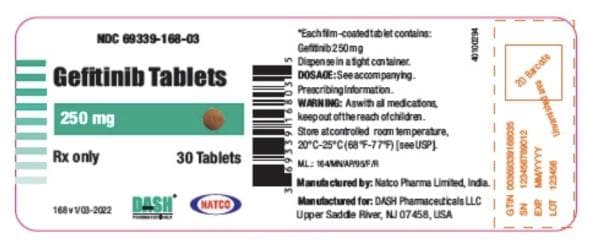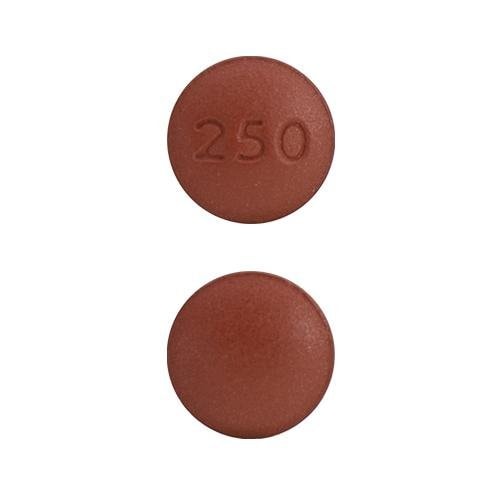What is gefitinib used for?
- Gefitinib is used to treat lung cancer.
Before taking gefitinib, tell your doctor:
- If you are allergic to gefitinib; any part of this medicine; or any other drugs, foods, or substances. Tell your doctor about the allergy and what signs you had.
- If you are breast-feeding. Do not breast-feed while you take gefitinib.
This medicine may interact with other drugs or health problems.
Tell your doctor and pharmacist about all of your drugs (prescription or OTC, natural products, vitamins) and health problems. You must check to make sure that it is safe for you to take gefitinib with all of your drugs and health problems. Do not start, stop, or change the dose of any drug without checking with your doctor.
What are some things I need to know or do while I take gefitinib?
- Tell all of your health care providers that you take gefitinib. This includes your doctors, nurses, pharmacists, and dentists.
- Have blood work checked as you have been told by the doctor. Talk with the doctor.
- Holes in the GI (gastrointestinal) tract may rarely happen.
- This medicine may cause fertility problems. This may affect being able to have children. Talk with the doctor.
- This medicine may cause harm to the unborn baby if you take it while you are pregnant.
- Women must use birth control while taking gefitinib and for some time after the last dose. Ask your doctor how long to use birth control. If you get pregnant, call your doctor right away.
How is gefitinib best taken?
Use gefitinib as ordered by your doctor. Read all information given to you. Follow all instructions closely.
- Take with or without food.
- Keep taking gefitinib as you have been told by your doctor or other health care provider, even if you feel well.
- You may put the tablets in 4 to 8 ounces (120 to 240 mL) of water. Stir for about 15 minutes and drink right away. Rinse the glass with 4 to 8 ounces (120 to 240 mL) of water and drink right away.
- If you take cimetidine, dexlansoprazole, esomeprazole, famotidine, lansoprazole, nizatidine, omeprazole, pantoprazole, rabeprazole, or ranitidine, ask your doctor or pharmacist how to take it with gefitinib.
- Talk with your doctor before you take antacids while you are taking gefitinib.
- Those who have feeding tubes may use gefitinib. Use as you have been told. Flush the feeding tube after gefitinib is given.
What do I do if I miss a dose?
- Take a missed dose as soon as you think about it.
- If it is less than 12 hours until the next dose, skip the missed dose and go back to your normal time.
- Do not take 2 doses at the same time or extra doses.
What are the side effects of gefitinib that I need to call my doctor about immediately?
WARNING/CAUTION: Even though it may be rare, some people may have very bad and sometimes deadly side effects when taking a drug. Tell your doctor or get medical help right away if you have any of the following signs or symptoms that may be related to a very bad side effect:
- Signs of an allergic reaction, like rash; hives; itching; red, swollen, blistered, or peeling skin with or without fever; wheezing; tightness in the chest or throat; trouble breathing, swallowing, or talking; unusual hoarseness; or swelling of the mouth, face, lips, tongue, or throat.
- Fever.
- Change in eyesight, eye pain, or very bad eye irritation.
- If bright lights bother your eyes.
- Very bad belly pain.
- Chest pain or pressure.
- Coughing up blood.
- Mouth irritation or mouth sores.
- Severe diarrhea.
- Diarrhea that will not go away.
- Very bad and sometimes deadly liver problems have happened with gefitinib. Call your doctor right away if you have signs of liver problems like dark urine, feeling tired, not hungry, upset stomach or stomach pain, light-colored stools, throwing up, or yellow skin or eyes.
- A very bad skin reaction (Stevens-Johnson syndrome/toxic epidermal necrolysis) may happen. It can cause very bad health problems that may not go away, and sometimes death. Get medical help right away if you have signs like red, swollen, blistered, or peeling skin (with or without fever); red or irritated eyes; or sores in your mouth, throat, nose, or eyes.
- Some people have had lung problems with gefitinib. Sometimes, this has been deadly. Call your doctor right away if you have signs of lung problems like shortness of breath or other trouble breathing, cough that is new or worse, or fever.
What are some other side effects of gefitinib?
All drugs may cause side effects. However, many people have no side effects or only have minor side effects. Call your doctor or get medical help if any of these side effects or any other side effects bother you or do not go away:
- Upset stomach or throwing up.
- Diarrhea.
- Skin irritation.
- Pimples (acne).
- Dry skin.
- Change in nails.
- Not hungry.
- Dry eyes.
- Eye irritation.
- Feeling tired or weak.
These are not all of the side effects that may occur. If you have questions about side effects, call your doctor. Call your doctor for medical advice about side effects.
You may report side effects to the FDA at 1-800-332-1088. You may also report side effects at https://www.fda.gov/medwatch.
If overdose is suspected:
If you think there has been an overdose, call your poison control center or get medical care right away. Be ready to tell or show what was taken, how much, and when it happened.
Gefitinib Images
How do I store and/or throw out gefitinib?
- Store at room temperature.
- Store in a dry place. Do not store in a bathroom.
- Keep all drugs in a safe place. Keep all drugs out of the reach of children and pets.
- Throw away unused or expired drugs. Do not flush down a toilet or pour down a drain unless you are told to do so. Check with your pharmacist if you have questions about the best way to throw out drugs. There may be drug take-back programs in your area.
Consumer information use and disclaimer
- If your symptoms or health problems do not get better or if they become worse, call your doctor.
- Do not share your drugs with others and do not take anyone else's drugs.
- Some drugs may have another patient information leaflet. Check with your pharmacist. If you have any questions about gefitinib, please talk with your doctor, nurse, pharmacist, or other health care provider.
- If you think there has been an overdose, call your poison control center or get medical care right away. Be ready to tell or show what was taken, how much, and when it happened.
This information should not be used to decide whether or not to take gefitinib or any other medicine. Only the healthcare provider has the knowledge and training to decide which medicines are right for a specific patient. This information does not endorse any medicine as safe, effective, or approved for treating any patient or health condition. This is only a brief summary of general information about this medicine. It does NOT include all information about the possible uses, directions, warnings, precautions, interactions, adverse effects, or risks that may apply to gefitinib. This information is not specific medical advice and does not replace information you receive from the healthcare provider. You must talk with the healthcare provider for complete information about the risks and benefits of using this medicine.





